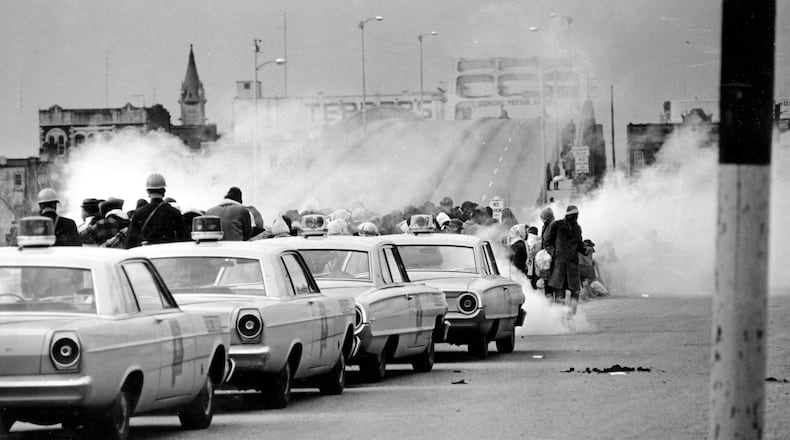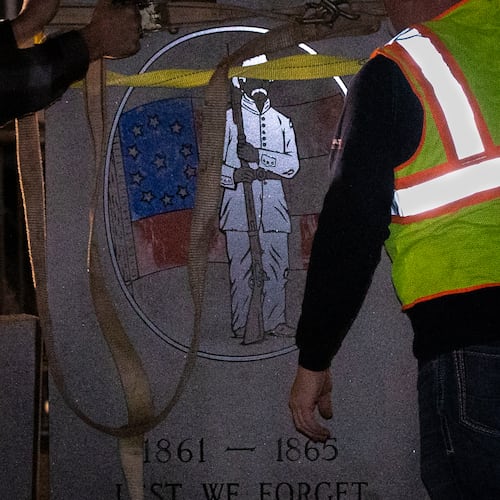Were the lives of black Atlantans visible to the white press in 1968?
Xernona Clayton had her doubts. When she moved to Atlanta in 1965 to organize events for the Southern Christian Leadership Conference, she was impressed by the wedding pages in The Atlanta Constitution, until she noticed something was missing.
“I thought, ‘Gee, don’t black girls get married in Atlanta?’” said Clayton.
» AJC/WSB special report: Honoring Dr. King
More troubling still, the most significant narrative in black America, the civil rights movement, was being shortchanged by some publications.
“We did not do a good job in covering the biggest story in my lifetime,” said Jeff Nesmith, 77, from his home in Alexandria, Va.
Nesmith was assistant city editor at The Atlanta Constitution, where management was reluctant to send reporters out of the state to cover major events for fear of losing advertising dollars. The Constitution was also home to the crusading columnist Ralph McGill, probably the most progressive voice in Southern media. In spite of McGill’s aggressive support of civil rights, the Constitution used wire stories to cover such momentous events as the violence at Selma.
McGill frequently fought with higher-ups on the topic. Jim Bentley, 81, who started at the Constitution in 1958, said the owners reasoned, “If we covered (the Selma march) we would look to the advertisers and readers as troublemakers who were encouraging the civil rights movement.”
In his biography of McGill, Harold Martin wrote, “It was a grievous embarrassment to McGill that his paper, during the cataclysmic years of the civil rights struggle, chose to play down the news of the great confrontations, leaving the coverage of such events as Martin Luther King’s Birmingham sit-ins and the Selma march to the wire services and the national press. It pointed up the fact that, though McGill had the title of publisher and had held the title of editor, neither rank carried with it command of the coverage or play of the news.”
Gene Patterson, who won a Pulitzer in 1967 for his editorials, was equally troubled. Former AJC managing editor Hank Klibanoff co-wrote the definitive account of the newspapers and broadcast media covering the civil rights movement in his Pulitzer-winning 2007 book “The Race Beat,” and he recently surveyed the archive of personal papers that Patterson gave to Emory University.
Recounting the days after the 1965 Selma march, Klibanoff wrote in Atlanta Magazine, “The Constitution had just suffered a huge loss: Pulitzer Prize-winning reporter Jack Nelson had left to join the Los Angeles Times as Atlanta bureau chief. Among his former Constitution colleagues, ‘Nelson has been wondering aloud, where our people can hear him, why Los Angeles covers the South and Atlanta doesn’t,’ Patterson typed on an interoffice memo to (Jack) Tarver.”
Then he revealed an even greater humiliation: Tom Winship, editor of the Boston Globe, had called McGill “asking if our man in Selma could write him a special and McGill lied to him, saying our man was just back and busy, so McGill wrote six pages for Boston himself.” The Constitution, of course, had no man in Selma.
It wasn’t just the news columns, but the newsrooms themselves, in which black lives were absent. Black journalists were largely absent from the staffs of Atlanta’s large dailies and invisible on local television crews.
“They didn’t cover most of that stuff in Alabama,” said Alexis Scott, one of the Constitution’s first African-American reporters, who was hired as a general assignment reporter in 1974. “They might have a brief on page 25-K, where the grocery ads are.”
Coverage changed after the assassination
The King assassination seemed to rewire the media environment.
Nesmith remembers the evening of April 4, 1968, when the news arrived like a lighting bolt. King had been shot in Memphis. “I remember the telegraph editor calling over to the city editor saying, ‘He’s dead.’”
Nesmith sprang into action. The Constitution had no reporters in Memphis following King (unlike the New York Times), but all hands responded in Atlanta. Nesmith interviewed Hosea Williams. Achsah Nesmith (Jeff’s wife and a reporter at the Constitution) interviewed Martin Luther King Sr. (“Daddy King”) and King’s attorney, Donald Hollowell.
Bill Winn, a reporter for The Atlanta Journal, got on a plane to Memphis but didn’t stay long. He came back to Atlanta to report on the crowd at the airport that awaited King’s body.
The dailies recognized the significance of the catastrophe. Few reporters slept. Story followed story as Atlanta planned for King’s funeral and the manhunt for his killer led to a white Mustang parked downtown near Capitol Homes.
Robert “Bob” Hurt, a veteran who’d been serving in Vietnam, returned to the Constitution only shortly before King’s death. Hurt was assigned to write about James Earl Ray. Said Nesmith, “He uncovered the fact that the guy had stalked King all over Atlanta.”
Both papers expended enormous resources and energy. “We put out a great paper that night,” said Bentley, and the same could be said for the ensuing weeks.
The papers also began to re-examine built-in bias. For example, they would only identify the race of a suspect in crime stories if the suspect was black. That led over the years to me telling newbies that if they found a rule that kept them from doing what was right, they should make a new rule,” said Bentley.
‘The juice was (not) worth the squeeze’
The local white-owned newspapers weren’t the only publications that seemed to lack enthusiasm for civil rights protesters. Though the black-owned Atlanta Daily World campaigned for voting rights for blacks and fought against police brutality, its editor and publisher, C.A. Scott, disapproved of the street movement.
“A bunch of people marching in the streets getting their heads beat in, what does it accomplish?” asked a rhetorical Alexis Scott, who left the Constitution and succeeded her uncle as publisher of the Daily World in 1997. “C.A. didn’t believe the juice was worth the squeeze.”
Black-owned newspapers supporting a more activist philosophy sprang up, including the Atlanta Voice, co-founded in 1966 by Xernona Clayton’s late-husband, Ed Clayton.
And black media figures, such as Atlanta Daily World alumnus Paul Delaney (who eventually co-founded the National Association of Black Journalists), had an influence on “white” newspapers.
Xernona Clayton, who became the first black television talk show host in Atlanta, was friendly with Ralph McGill and often called on him when his newspaper came up short. “He’d say ‘OK, Xernona, what did we do wrong today?’”
With prompting from Clayton, black weddings began to appear in the Constitution. And, with the sponsorship of McGill, the Atlanta Press Club welcomed its first black member: Clayton. “I loved him dearly,” she said of McGill. “I really did.”
The March 21 documentary 'The Last Days of Dr. Martin Luther King Jr.' on Channel 2 kicked off a countdown of remembrance across the combined platforms of Channel 2 and its partners, The Atlanta Journal-Constitution and WSB Radio.
The three Atlanta news sources will release comprehensive multi-platform content until April 9, the anniversary of King’s funeral.
On April 4, the 50th anniversary of Dr. King’s assassination, the three properties will devote extensive live coverage to the memorials in Atlanta, Memphis and around the country.
The project will present a living timeline in real time as it occurred on that day in 1968, right down to the time the fatal shot was fired that ended his life an hour later.
The project will culminate on April 9 with coverage of the special processional in Atlanta marking the path of Dr. King’s funeral, which was watched by the world.
About the Author
Keep Reading
The Latest
Featured








